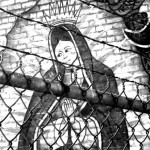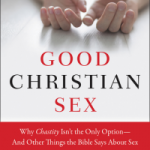[Content Note: Victim Blaming, Abusive Relationships]
The topic of victim blaming has been on my mind quite a bit lately.
As I mentioned in a previous post, the Wisdom Literature in the Bible–which I’ve been studying for a class I’m taking–takes an ambivalent approach toward victim blaming. While Proverbs almost always promotes a doctrine of retribution where “what goes around comes around,” the book of Job radically and passionately challenges this idea.
Also, my church (The University Church in Toledo, Ohio–a great place to check out if you live in the area!) recently began a sermon series on the topic, which I find so important. I wish more churches were having these kinds of conversations.
I was recently talking with my pastor, Dr. Julian Davies, about my class and about his sermon series, and this topic of blaming the victim–why do we do it? Julian gave one possible reason in our conversation, and I’ve been thinking about it. I agree with his reason, but would like to add a bit more to the conversation.
So, I’m going to do a short series here on the blog discussing three different reasons why we, as individuals and as a society in general, might have a tendency to blame victims. Let’s start with Julian’s theory, and in my next two posts, I’ll give you a couple theories of my own.
1. We Are Afraid of a World Outside of Our Control
The reason my pastor suggested that we, as a society, tend to blame the victim is because we are afraid. A world where bad things can happen to people who did nothing to deserve it can seem chaotic, and we’re afraid of that.
I agree with Julian here (I’ll get to the “But…” in another post).
I grew up in a church where the prevailing mindset was one where good things happen to good people, bad things happen to bad people, and if bad things happen to good people, it’s For A Reason, and if the good people have a positive attitude about their suffering, they will eventually be rewarded.
It’s a nice idea, until it clashes with real life experiences.
Until you’re the Good Christian Girl your entire life, and you still end up in an abusive relationship. Until you’re constantly switching back and forth between, “God, what did I do wrong to deserve this?” and “If I just put up with this abuse with a smile on my face, God will use me for His glory.”
This kind of thinking gets you stuck in a cycle of self-blaming and self-hatred, and/or passive acceptance and emotional suppression. Still, even when you are in such a situation, it can be scary to let go of the idea that victims are responsible for the bad things that happen to them, because it’s scary to be in situations outside of our control.
You see all of these Facebook memes about how we can’t control what others do or say, but we can control how we react. Why do we like these memes so much, and what do they have to do with victim blaming? The idea that by changing ourselves, we can change our lives, the things that happen to us, and how they affect us, is comforting.

[image: text reading “You can’t control other people. You can only control your reactions to them.”]
Unfortunately, it’s not always true. Changing myself years ago would not have stopped my abuser from hurting me (believe me, I tried). Changing myself now cannot take away my nightmares or stop my flashbacks. I can’t wake up in the morning and decide that I will just not be sad or angry about the memories of my past. Yes, I have somecontrol over my life (I can, and do, take medication and go to therapy), but not as much as these memes seem to suggest.
That’s scary.
But it’s also a relief at a certain point. I don’t have to blame myself. I can get help, instead of trying over and over again to will myself out of anxiety and depression. I can stop wondering how life would have been different if I just had/hadn’t done [fill in the blank].
So, I agree with Julian. Fear of a world that’s outside of our control is scary, and can lead us to the tendency to blame victims. In order to stop blaming victims, this is a fear that we must face.
But is this the only reason why we blame the victim? What other reasons could there be?
I’ll discuss reason number 2 in my next post. Until then, what do you think about this first point? What fears might be causing you to hold on to self-blame or blame of others? How can our churches and communities encourage people to let go of those fears?
____
Are you a fan of Sarah Over The Moon? Consider donating, using the Pay Pal Donate button the right-side column. Even $1 or $2 helps, and allows me to pay for books, classes, and internet service that I can use to make this blog even better! Can’t afford to donate? No problem! You can support Sarah Over The Moon by signing up for an email subscription, or even just by sharing this post with your friends!
Thank you!











